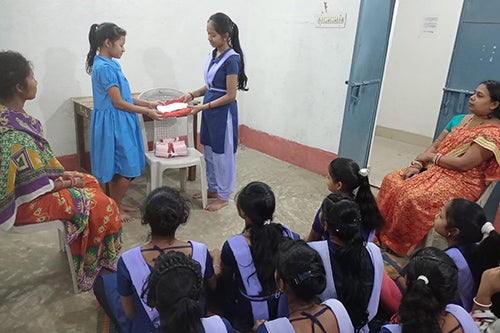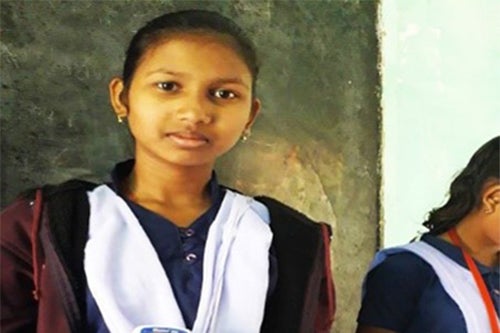News
Girl advocates in India step up to protect health, human rights amid the pandemic
- 18 May 2021
News
Kandhamal District, Odisha, India – As India grapples with a deadly surge in COVID-19 cases, registering thousands of deaths a day, front-line workers are labouring around the clock to save as many lives as possible. Young people, too, are doing their part to protect their communities from the virus. Malati, 15, in Kandhamal District, is one of these tireless young advocates.
Malati is a trained peer educator. When she returned to her home village in March 2020, after schools closed during the nationwide lockdown, she realized that myths and misinformation about the pandemic were widespread.
“On returning to my village, I soon realized that people here were unaware of the severity of COVID-19 and related safety protocols,” she told UNFPA. “People had minimal information on how the virus spreads, its symptoms and important precautions necessary to protect oneself from getting infected. There were also rumours propagated by misinformation going around the village leading to a sense of panic and anxiety.”
She took it upon herself to educate her fellow villagers.
“This is a challenging time for all of us, but we can overcome this if we follow COVID-19 appropriate behaviour as per government guidelines and protect ourselves from misinformation and fake news,” she said.

Malati trained as a peer educator in 2019 through a UNFPA- and Azim Premji Philanthropic Initiative-supported programme, designed to empower adolescents with information about health, nutrition and human rights. The programme, which ran for three years, targeted vulnerable communities and other marginalized adolescents studying in residential schools of Odisha state, training them to become youth leaders and peer mentors.
When the pandemic struck, Malati studied the leaflets distributed by health officials, and then coordinated with the auxiliary nurse midwife and accredited social health activist in her village, as well as other girl activists, to conduct a door-to-door campaign. Together, they provided accurate information about COVID-19 and dispelled myths. They also demonstrated preventative measures including hand-washing, use of masks and social distancing.
The work was challenging.
“People would ignore me, but I never let myself feel demotivated.” she recalled. “ I was in constant touch with my teacher and matron” – a staff member trained in student health and welfare – “who would encourage me to work harder.”
Eventually, she said, “people in my village started listening to me and acknowledging my efforts.”
The spread of the illness has only intensified in recent weeks, making Malati’s efforts – and the lessons she imparted – all the more critical.
Malati also used the opportunity to raise information about the harms of child marriage, a practice that has escalated amid pandemic-related economic hardship. She even formed a group to monitor the incidence of both COVID-19 and child marriage in her village.
Other peer educators from the same programme have undertaken similar efforts.
Monalisha, 15, a student in Keonjhar District, used her training to raise awareness about menstruation and to dispel menstruation myths.
“I remember when I reached menarche, I was terrified,” she recalled. Misinformation and unhealthy practices were common, she said. “In my village, my mother and all my friends would use and re-use the same cloth during their period, which would lead to infection.”

She began to speak directly with younger students to ensure they had accurate, non-stigmatizing information about menstruation. Under pandemic-related lockdowns, she has continued these efforts in her community.
The partnership has achieved concrete results. One effort – anaemia screening and referrals – helped result in a decline in the prevalence of anaemia from 79 per cent in 2019 to 50 per cent in 2020 among adolescents in five districts of Odisha.
The peer educator approach has also expanded across the state, with 664 young people trained through this programme, and 2,600 trained by the state, with technical support from UNFPA. In addition, the programme has resulted in a resource pool of trained teachers, matrons, and auxiliary nurse midwives available to provide life-skills education.
Many of these empowered, educated community advocates are, like Malati, turning their attention to stop the spread of COVID-19 in their communities.
"Our objective was to build knowledge and skills among adolescent girls and boys from vulnerable communities so they make responsible and informed decisions about their lives,” said Dr. Deepa Prasad, the state programme coordinator with UNFPA. “Little did we know that they would be a medium to educate their communities during a pandemic.”
Many of the adolescents reached are first-generation learners, she added, “and from what I hear from the field, I am sure many of them will go on to become movers and shakers in their families and communities.”